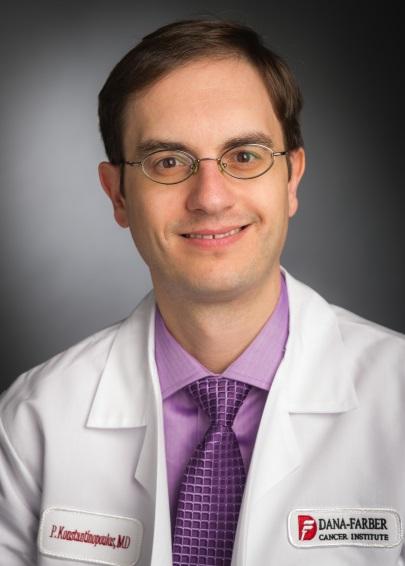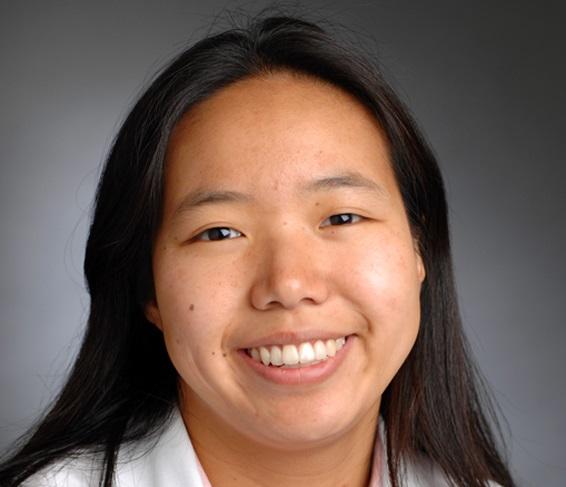Dana-Farber opens new clinical trials for patients with endometrial cancer
A recent dearth of clinical trials of treatments for endometrial cancer has segued into a research revival – including four new trials led by Dana-Farber investigators – spurred by advances in the scientific understanding of the disease.
The trials are especially welcome for the 10 to 15 percent of patients with endometrial cancer who are diagnosed with an advanced stage of the disease. These patients almost invariably relapse after receiving standard therapy, at which point the disease generally can’t be cured with existing drugs.
“Approximately 42,000 women in the U.S. are diagnosed with endometrial cancer each year,” says Panos Konstantinopoulos, MD, PhD, director of translational research in gynecologic oncology at the Susan F. Smith Center for Women’s Cancers. “For the 90 percent of patients with early-stage disease, standard therapy is curative. For patients with later-stage disease, we urgently need novel treatments.”
Dana-Farber research into the biology of endometrial cancer suggested promising new ways of attacking the disease with targeted therapies as well as immunotherapies. Konstantinopulos and his fellow scientists approached several pharmaceutical firms with proposals for clinical trials involving their drugs. Their initiative resulted in four new phase II trials, either recently opened or opening shortly.
- A trial led by Konstantinopoulos that combines an immune checkpoint inhibitor called avelumab and a PARP inhibitor called talazoparib. (Checkpoint inhibitors clear the way for an immune system attack on cancer; PARP inhibitors undermine cancer cells by impeding their ability to repair damaged DNA.) In a previous trial, avelumab was very effective in patients with endometrial cancer with “microsatellite instability” (MSI) – a high tendency to mutate – but was largely inactive in the much more common “microsatellite stable” (MSS) form of the disease. The trial, which is expected to open in a month or two, will explore whether pairing avelumab with a PARP inhibitor is more effective in patients with MSS disease.
- A trial led by Jennifer Veneris, MD, PhD, of the Gynecologic Oncology program that combines the checkpoint inhibitor pembrolizumab with an antibody-drug conjugate called mirvetuximab. (Pembrolizumab targets an immune checkpoint protein called PD-1; mirvetuximab joins an antibody to a drug molecule that targets a key structure in fast-dividing cancer cells.) The trial, slated to open in the next few months, is open to patients with MSS endometrial cancer whose tumor cells have a folate receptor α on their surface.
- A trial led by Konstantinopoulos of a combination of the targeted drug abemaciclib, a new drug compound called LY3023414, and hormonal therapy in patients with high-risk endometrial cancer. (LY3023414 targets a cancer cell enzyme called PI 3-kinase; abemaciclib interferes with a key phase of the cell cycle.) Between 70 and 90 percent of endometrial cancers are fueled by the hormone estrogen and initially respond to hormone-blocking therapy, but eventually relapse. By adding abemaciclib and LY3023414, which strike two parts of the same molecular pathway, to hormone-blocking therapy, investigators hope to overcome the problem of drug resistance.
- A trial led by Joyce Liu, MD, MPH, director of clinical research in the Division of Gynecologic Oncology, of the targeted therapy AZD1775 in patients with high-grade serous uterine cancer, which accounts for 10-15 percent of endometrial cancers. Such cancers are aggressive and usually recur after standard therapy. The trial, which recently opened, is based on research led by Liu and Ursula Matulonis, MD, chief of the Division of Gynecologic Oncology, showing that AZD1775 has activity in patient-derived models of high-grade serous ovarian cancer that share several genetic features with high-grade serous endometrial cancer.
Each of the trials addresses a shortcoming of standard therapy or a problem identified in previous trials of novel drugs, Konstantinopoulos notes. The first two trials, for example, seek to overcome the fact that immunotherapies haven’t worked well in patients with MSS disease. The third tackles the problem of resistance to hormone therapies, and the fourth targets a specific subtype of endothelial cancer.
Collectively, the four trials will enroll between 150 and 200 women. Investigators hope to complete the trials within the next two years.
Media Contacts
If you are a journalist and have a question about this story, please call 617-632-4090 and ask to speak to a member of the media team, or email media@dfci.harvard.edu.
The Media Team cannot respond to patient inquiries. For more information, please see Contact Us.


